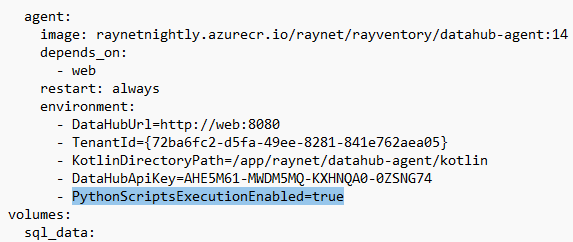Manual installation
DataHub Agent for Docker can be installed from the following image:
raynetgmbh/rayventory-datahubagent
The following variables are available when creating the container from image raynetgmbh/rayventory-datahubagent:
Environment variable |
Description and sample value |
DataHubAgent_DataHubUrl |
The URL of the Data Hub server. This may be an URL referring the internal service name, when the image is started from a docker compose file.
Example value: |
DataHubAgent_TenantId |
A GUID value, representing the tenant ID. You can get your tenant ID by opening the Administration > Agents page, and pressing a button to install a new agent. Example value: |
DataHubAgentAPIKey |
An API key representing the authentication token required for the Agent to communicate with DataHub. You can generate this API key by navigating to the Profile page of your tenant.
Example value: {2cfv3z6-rd04gcp-nf0bwkz-ff5s3jr} |
Installation with docker-compose
You can install an agent from the standard Docker compose file. For more information, refer to the following chapter: Usage
Enable Python Script Execution
To enable Python script execution in the Docker environment for Data Hub Agent, add the PythonScriptsExecutionEnabled=true environment variable
to the Docker setup, as described below. By default, Python script execution is disabled in the Data Hub Agent configuration, with the
PythonScriptsExecutionEnabled variable set to false upon installation. Without this adjustment, Python scripts (e.g., those using the requests library) will not run as expected.
 |
•When using a docker-compose.yml file, set the variable PythonScriptsExecutionEnabled=true. •Alternatively, for a terminal-based approach, run the command: docker run -e PythonScriptsExecutionEnabled=true -p 8080:8080 <%DOCKER_IMAGE_NAME%>, replacing with the specific Docker image name, adjust the port if necessary
•Stop the running Docker container with the command: docker-compose down
•Start the container with the updated configuration: docker-compose up -d
•Verify that the Docker container is running with the command: docker ps |
Python scripts can now be executed as tasks in Data Hub.